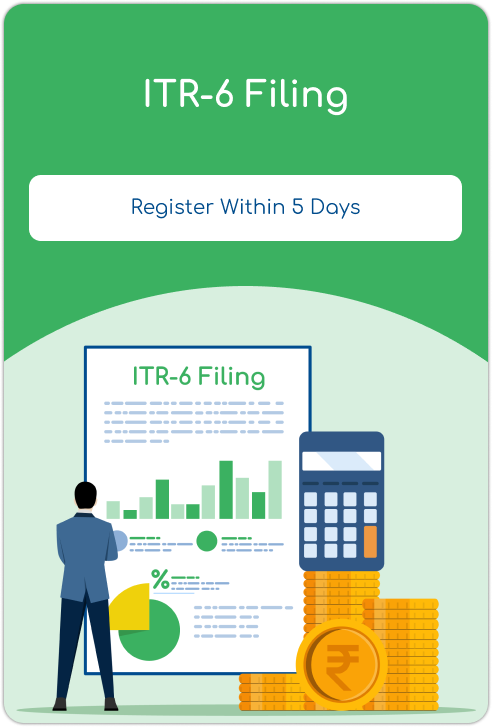
File Your ITR-6
1263 customers
What will you get?
Billing Application
Access of Android
Access of Web Application
Account Writing
Debtors, Creditors monitoring
Income Tax filling
GST Compliances
Financial Planning
Loan Advisory Services
What do we Require?
INR 0 Taxes As Applicable















Introduction
ProMunim assists charitable organizations and donors in obtaining 80G registration under the Income Tax Act, allowing them to claim tax exemptions. This registration provision, introduced by the Finance Act 2020, allows donors to claim deductions on donations made to eligible charitable organisations. The amendments include the requirement for annual returns, verification of donees by the Income Tax Department, and the possibility of reassessing and revoking registrations for non-compliance. These changes aim to promote transparency, accountability, and ensure donations are directed to genuine charitable institutions. It is essential for organizations and donors to familiarize themselves with these amendments for smooth operations.
Benefits for the Charitable Organization:
- Tax Exemption for Donations:Donations made to an organization with 80G registration are eligible for tax deductions under Section 80G of the Income Tax Act, 1961. This encourages individuals and businesses to contribute to the organization's charitable activities.
- Increased Credibility:80G registrations enhances the credibility and trustworthiness of the organization in the eyes of potential donors, as it signifies that the organization has been vetted and approved by the Income Tax Department.
- Attracting More Donations:Eligibility for tax deductions motivates individuals and businesses to donate to the organization, leading to increased funding for its charitable projects and activities.
- Access to Corporate Social Responsibility (CSR) Funds:Many corporate entities prefer to channel their CSR funds to organizations with 80G registration, as it allows them to claim tax benefits on their contributions.
- Facilitates Foreign Contributions:80G registration can facilitate donations from foreign individuals and organizations by providing them with assurance regarding the legitimacy and tax-exempt status of the recipient organization.
Benefits for Donors:
- Tax Deductions:Donors can claim deductions on donations made to organizations with 80G registration, reducing their taxable income and overall tax liability. The amount of deduction varies depending on the provisions of Section 80G.
- Encourages Philanthropy:Tax benefits incentivize individuals and businesses to contribute to charitable causes, thereby promoting a culture of philanthropy and social responsibility.
- Assurance of Legitimacy:Donors can be assured of the legitimacy and credibility of the organization, as 80G registration signifies that the organization has met certain criteria and has been approved by the Income Tax Department.
- Transparent Use of Funds:Registered organizations are required to maintain proper accounts and provide transparency in the utilization of funds, giving donor’s confidence that their contributions are being used for legitimate charitable purposes.
Eligibility criteria for obtaining 80G registration:
- Nature of the Organization:The organization must be registered as a charitable trust, a society, or a section 8 company under the Indian Companies Act, 2013 (formerly Section 25 of the Companies Act, 1956).
- Purpose:The organization's primary purpose must be charitable, religious, educational, or for the advancement of any other object of general public utility. It should not be for the benefit of any particular caste or community.
- No Profit Motive:The institution should not be operated for profit, and its income and assets should only be used for the purpose of promoting its objectives.
- Compliance with Tax Laws:The organization must comply with the provisions of the Income Tax Act, 1961, including maintaining proper books of accounts and filing annual returns.
- Approval from Income Tax Authorities:The organization must apply for and obtain approval from the Income Tax Department under Section 80G of the Income Tax Act, which allows donors to claim deductions on donations made to the organization.
- Not Disqualified:The institution must not be disqualified under Section 80G or any other provisions of the Income Tax Act.
- Documentation:The organization needs to submit relevant documents along with the application, including the registration certificate, memorandum of association, articles of association, audited financial statements, and details of activities undertaken.
Documents required:
- Application Form:The prescribed application form for seeking approval under Section 80G of the Income Tax Act, 1961.
- Registration Certificate:Certificate of registration of the organization as a charitable trust, society, or section 8 company.
- Memorandum of Association (MOA) and Articles of Association (AOA):Copies of the MOA and AOA of the organization, which outline its objectives and rules of operation.
- Financial Statements:Audited financial statements, including the balance sheet, income and expenditure statement, and receipts and payment account for the last three years.
- PAN Card:Copy of the Permanent Account Number (PAN) card of the organization.
- Board Resolution:Resolution passed by the governing body or board of trustees authorizing the application for 80G registration.
- Evidence of Activities:Details of the activities carried out by the organization in furtherance of its objectives, including brochures, pamphlets, project reports, etc.
- Details of Trustees or Governing Body:List of trustees or members of the governing body, along with their contact details and PAN cards.
- FCRA Registration (if applicable):If the organization receives foreign contributions, a copy of the registration certificate under the Foreign Contribution (Regulation) Act, 2010 (FCRA) may be required.
- Proof of Address:Address proof of the registered office of the organization, such as a utility bill or rental agreement.
- Registration under 12A/12AA (if applicable):If the organization is registered under Section 12A or 12AA of the Income Tax Act, copies of the registration certificate may be needed.
- Any other documents as required by the Income Tax Department:Depending on the specific requirements of the Income Tax Department or any additional conditions applicable to the organization, other documents may be requested.

